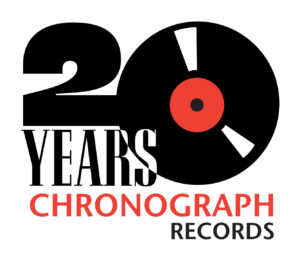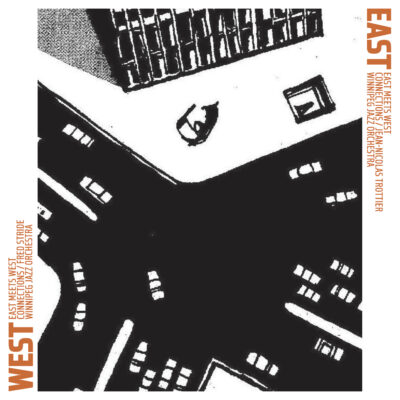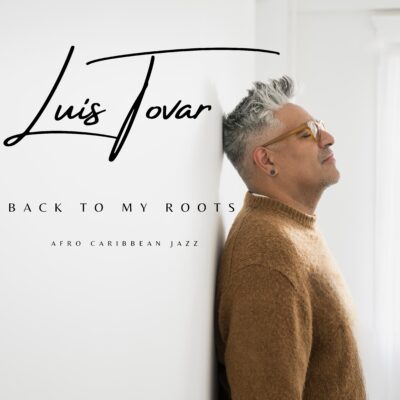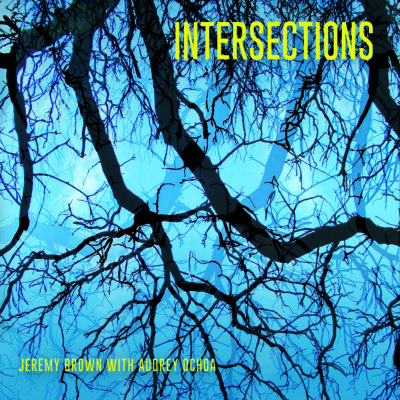The Winnipeg Jazz Orchestra presents East Meets West: Connections
THE WINNIPEG JAZZ ORCHESTRA
PRESENTS
EAST MEETS WEST: CONNECTIONS
Now Available on Chronograph Records
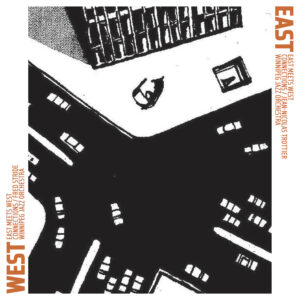
Following up their 2024 Downbeat Editor’s Pick “Tidal Currents”, “Connections” is an exciting nine-movement collaboration between the WJO and two phenomenal talents of Canadian jazz composition: Fred Stride and Jean-Nicolas Trottier. [CR-115]
Personnel
Neil Watson – Alto Sax
Jonathan Stevens – Alto Sax
Niall Cade – Tenor Sax
Monica Jones – Tenor Sax
Kyle Wedlake – Baritone sax
Jean-Nicolas Trottier – Lead Trombone
Jeremy Duggleby – Trombone
Karin Carlson – Trombone
Joel Green – Trombone
Isabelle Lavoie – Bass Trombone
Shane Hicks – Lead Trumpet
Jonathan Challoner – Trumpet
Matthew Walden – Trumpet
Richard Gillis – Trumpet
Andrew Littleford – Trumpet
Will Bonness – Piano
Karl Kohut – Bass
Fabio Ragnelli – Drums
Victoria Sparks – Vibraphone
Larry Roy – Guitar
Track Listing
(100% MAP, focus tracks in bold)
- Sounds of Joy (Trottier) 7:54
Soloists: Niall Cade (tenor sax), Kyle Wedlake (baritone sax)
- Hello Jean-Nicolas (Stride) 2:15
Soloist: Jean-Nicolas Trottier (trombone)
- Leave No Stone (Stride) 7:38
Soloist: Niall Cade (tenor sax)
- Echoes From Within (Trottier) 1:45
Soloists: Trombone ensemble
- The Healing Song (Trottier) 7:56
Soloists: Larry Roy (guitar), Will Bonness (piano), Karl Kohut (bass)
- Halfway Point (Stride) 7:31
Jonathan Challoner (trumpet), Neil Watson (soprano sax)
- Another Look (Stride) 5:26
Soloist: Andrew Littleford (trumpet)
- The Jaws of Defeat (Trottier) 3:36
Soloists: Fabio Ragnelli (drums), Niall Cade (tenor sax)
- The Great Return (Trottier) 5:19
Soloist: Will Bonness (piano)
Runtime 49:20
What Folks Are Saying
Praise for February 2024 release “Tidal Currents”
- Downbeat Magazine Editor’s pick, 4 stars
- Textura Top 30 Jazz Albums of 2024
- “Featuring sweeping, evocative harmonies and memorable soprano saxophone solos, Tidal Currents: East Meets West is extraordinary, vibrant original work, highly recommended especially for big band jazz connoisseurs.” – Midwest Book Review
- “This is a stellar release by a superb ensemble, with thought-provoking compositions from the featured guests. Multiple listening sessions will reveal new layers each time.” – David Reed, The Belleville Intelligencer
- “…a terrific ensemble whose seventh release maintains the high standard set by its predecessors…The four pieces form a half-hour suite whose rewards are plentiful, thanks to the playing of the ensemble as well as the quality of the material the composers provided to them…a splendid addition to the group’s discography.” – Ron Schepper, Textura
- “…venerable and always excellent…Impeccable recorded sound does the whole project justice.” – Robert Rowat, CBC
About the WJO
The Winnipeg Jazz Orchestra (WJO) is Canada’s first community-based, non-profit professional jazz orchestra. Founded in 1997 (registered charity in 2000), the WJO has matured to become an important part of Winnipeg’s cultural landscape, reflected in the ongoing support the organization receives from the Manitoba Arts Council, the Winnipeg Arts Council, the Winnipeg Foundation, and other sponsors. The mandate of the Winnipeg Jazz Orchestra is to be an instrumental force in the promotion and development of big band jazz in Manitoba and beyond, through performance, composition, recording and education.
The WJO has sought to fulfill this mandate in several ways. They present a regular concert series that reflects the diversity of approaches to big band performance and repertoire. They hire Manitoba’s best professional jazz musicians to make up the ensemble, and allow for a rotation of personnel to bring in up and coming musicians. The WJO seeks to present the best big band jazz compositions and arrangements available, and they encourage new work through the commission of new compositions and arrangements for big band by Canadian and Manitoban composers (over 100 have been written for the WJO to date).
The orchestra collaborates with national and international guest performers and conductors that have informed and developed the ensemble, musicians and audience. The organization gives back to the community through educational outreach programs and projects including school ensemble performances at WJO concerts, their High School Honour Jazz Band project (a collaboration with Jazz Winnipeg Festival), and big band workshops held in several Winnipeg schools. Finally, they fulfill their mandate through recording the ensemble and its original music. The WJO has released seven albums to date, with many more on the way.
For more info: winnipegjazzorchestra.com
About Connections
The Winnipeg Jazz Orchestra’s eighth album release features new works by Canadian composers Fred Stride and Jean-Nicolas Trottier. A key goal of the WJO is fostering connections between jazz performers and composers across Canada. Several years ago, the WJO approached Montreal-based Trottier to propose a collaborative commission. Without hesitation, he suggested Fred Stride, whom he had met in 2011 when Stride was presenting masterclasses at the University of Montreal. The collaboration resulted in the stunning nine-movement suite featured on this album. Fred and Jean-Nicolas are prolific jazz composers and the WJO is thrilled to bring them together on this project.
Sounds of Joy (Jean-Nicolas Trottier): “This movement was the first one I wrote and it was inspired by the great Joe Lovano. I really dig the concept that music is the sound of joy and that’s what I tried to put forward. I had the idea to use morse code as a rhythmic component and so the entire melody is based on this song’s title as rhythm. That set the tone for further exploration of this idea in the other movements.”
Hello Jean-Nicolas (Fred Stride): “Once we had each written a couple of substantial movements, Jean-Nicolas and I decided to write something short, of around 2 minutes in length. I wrote my ‘musical connector’ using an idea Jean-Nicolas used in his Sounds Of Joy: morse code. I then entered Hello Jean-Nicolas into an online morse code translator and transcribed the resulting rhythm. This was then looped, as if calling out: ‘Hello Jean-Nicolas’. Of course Jean-Nicholas has the solo spot.”
Leave No Stone (Fred Stride): “I’m attracted to music that has shifts in colours, textures, tension and release – music that tells a story with, hopefully, surprising twists and turns. Leave No Stone is a solo feature for tenor saxophone soloist Niall Cade to leisurely explore the changing harmonic settings and moods.”
Echoes From Within (Jean-Nicolas Trottier): “This movement is a choral feature for the trombone section. I felt that I needed something simple, so I went with the idea. Being a trombonist myself, it reminded me of some music that I’ve been playing in trombone quartets over the years.”
The Healing Song (Jean-Nicolas Trottier): “This title perfectly explains the purpose of this tune… During the compositional process, I became ill at some point. I decided to write this song as a way to help me heal. I truly believe in the healing power of music and writing this piece helped me a whole lot to get through the rough times.”
Halfway Point (Fred Stride): “This virtuosic piece is the first movement I wrote for the suite, and it explores the connections between the instruments of the band, as ideas are quickly passed between individuals and sections. The title is a reference to Winnipeg which is very close to halfway (by air) between Vancouver and Montreal.”
Another Look (Fred Stride): “This movement, which is the last one I wrote, featuring the flugel horn and vibraphone, examines some of the musical ideas Jean-Nicolas and I had explored in our earlier movements. A musical reflection.”
The Jaws of Defeat (Jean-Nicolas Trottier): “I felt that the suite needed a dissonant and very powerful movement, but I didn’t know how to approach it. I came up with a last-minute concept of letters with some pitch equivalence, and spelled Fred Stride’s name to see what I would come up with. Funnily enough, the name was a blues lick! So I used it all over the place in the movement. The fact that I found that idea at the very last minute was for me to “snatch victory from the jaws of defeat”, so I named that movement after that expression.”
The Great Return (Jean-Nicolas Trottier): “The great return is a postlude to the suite, written for my late cat: Le Gris. My family and I are lovers of cats, and this one was gone for 3 weeks at some point. We thought he was gone for good, but he came back one night! We were so happy not to have lost him, that I decided to write a piece for him. Le Gris was a really fat cat, so the melody of the song features a big instrument, the baritone sax!”
